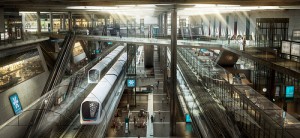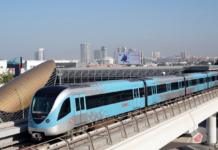By Bonnie James www.gulf-times.com
Qatar Railways Company (QRC), which is implementing the $40bn rail network, yesterday launched the very first set of contracts for “enabling works”, expecting companies to submit their proposals in a month, a senior official announced.
 “Four tunnelling RFP (request for proposal) contracts, each worth $2-$3bn, will be issued in April first week and work awarded in October,” deputy chief executive officer Geoff Mee told the Qatar Projects 2012 conference.
“Four tunnelling RFP (request for proposal) contracts, each worth $2-$3bn, will be issued in April first week and work awarded in October,” deputy chief executive officer Geoff Mee told the Qatar Projects 2012 conference.
The initial packages include one each for the Msheireb and Education City stations, the former expected to be the busiest station of the metro network.
“The project has been accelerated by 18 months on account of Qatar’s bid for the 2020 Olympics,” he explained while observing that the phase 1A of the metro needs to be finished in 2019.
Phase 1A, which comprises the four tunnelling packages and the Msheireb and Education City stations, will extend from the New Doha International Airport to the race circuit (Losail).
“Phase 1B (second phase) will see the metro stretching to Al Wakrah and Al Khor and expanding the initial network to all the stadiums for the 2022 FIFA World Cup,” Mee said.
The first phase involves 52km of single-bore tunnelling whereas the second phase has only a few more kilometres of tunnelling with the rest of the work being at elevated grade, outside the city.
“As soon as the contracts are awarded, we intend to order the tunnel boring machines; we are in discussions with the manufacturers,” the official stated.
The 30 pre-qualified contractors will be invited for presentations, regarding tunnelling, towards the end of this month and the most competent shortlisted.
QRC is holding a meeting on February 15 for Qatari businesses in the concrete manufacturing industry to give them an idea of the volume of concrete needed for the works.
Given the very compressed timescale, there will be restrictions on the number of contracts each consortium can bid for.
“It is vital for each international company to have a competent local partner who knows the ground reality,” the official said while stressing that only the best teams would be selected.
Considering that the construction period spans eight years, QRC is working with Ashghal (Public Works Authority) and other government agencies on how to control the cost escalation.
“There is no doubt about the viability of the mass rapid transport system in the Middle East. The success of the Dubai Metro is a good example. We are going to do it even better,” Mee said.




















